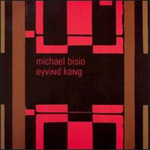| |
Meniscus Roundup #03 : Bisio/Kang + Dörner/Lonberg-Holm/Zerang
by Kevin Lian-Anderson
September 2000
 Just in its infancy, the Minneapolis label Meniscus has already chalked
up a formidable roster of releases, including ventures from master
improvisers John Butcher and Matthew Goodheart. Just in its infancy, the Minneapolis label Meniscus has already chalked
up a formidable roster of releases, including ventures from master
improvisers John Butcher and Matthew Goodheart.
Here, the
Bisio/Kang offering is the more compelling of the two with Kang's
punkish energy meshing gloriously with Bisio's merciless, yet versatile
bass sprawl. Throughout, Kang's scintillating violin flashes every
possible color in the tonal spectrum, his maniacal mewl and screech
on the last half of "After the Break" diminishing to introspective
plucking on "JGLag". On their absolutely beautiful rendering of Coltrane's
"Seraphic Light", Kang amazes with his anguished, keening high notes
screaming and swirling with unearthly fervor while Bisio's rugged,
relentless bass gravity fulfills its earthbound duty of anchoring
the whole blistering sermon by tugging and pushing Kang's burning
rainbow. They even play it somewhat straight on the relatively conventional,
bluesy head of "The Biszer", laying the melody open in the center,
and then returning home to the original riff. Sessions like this can
be slippery propositions in the quality department, but it's obvious
that both players' ears were open to each other's ideas and spontaneous
creativity, alternately tussling and locking it in as the situation
demanded.
 With
the trio effort, consisting of two notables from the Chicago new and
improvised music scene and likeminded German trumpeter Dörner,
the results are mixed. Sporadic victories are scattered amidst a field
of fidgety, ragged meanderings which are often too insubstantial to
sustain interest over the course of fifty-odd minutes. True, there
are moments of bristling tension, with edgy bits of threatening noise
bubbling up from the uncontained brew of fits and starts, but they
jar the listener only intermittently. Each piece finds the three agile
musicians balanced on a charged, taut wire which never really bends
enough to allow the players to do more than cagily stalk around each
other's staked-out territory. Dörner mostly eschews the conventional
note-making capabilities of his instrument, content to accent the
rhythmic slur of Lonberg-Holm's cello and Zerang's tribal drum and
patter with buzzes, splutters, squawks, and breathy, dripping washes.
The relative brevity of each selection helps matters, but the collective
tightrope is too frequently just dropped at show's end, plummeting
the artists abruptly into silent oblivion. With
the trio effort, consisting of two notables from the Chicago new and
improvised music scene and likeminded German trumpeter Dörner,
the results are mixed. Sporadic victories are scattered amidst a field
of fidgety, ragged meanderings which are often too insubstantial to
sustain interest over the course of fifty-odd minutes. True, there
are moments of bristling tension, with edgy bits of threatening noise
bubbling up from the uncontained brew of fits and starts, but they
jar the listener only intermittently. Each piece finds the three agile
musicians balanced on a charged, taut wire which never really bends
enough to allow the players to do more than cagily stalk around each
other's staked-out territory. Dörner mostly eschews the conventional
note-making capabilities of his instrument, content to accent the
rhythmic slur of Lonberg-Holm's cello and Zerang's tribal drum and
patter with buzzes, splutters, squawks, and breathy, dripping washes.
The relative brevity of each selection helps matters, but the collective
tightrope is too frequently just dropped at show's end, plummeting
the artists abruptly into silent oblivion.
Claque
is a promising excursion which falters and loses itself in its anxious
wanderings. MBEK is the satisfying, completed journey.
|
|
|
|
|

